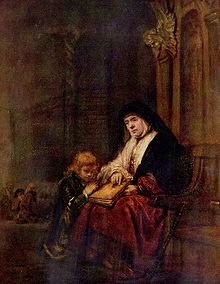Bible: What Does 1 Timothy 1-2 Teach Us About False Teachers, Prayer, and Order in the Church?
The Apostle Paul

Timothy (As a Boy)

The Law

Contend for the Faith
The First Epistle to Timothy
In his greeting, Paul identifies himself to Timothy, “a true son in the faith,” as one whom both “God our Savior and the Lord Jesus Christ, our hope” sent into the world with the gospel (vv. 1-2a).
[Paul acted as Timothy’s spiritual father as they traveled on their apostolic missions.
He designates the Father as Savior and the Son as the One upon whom they wait/trust.]
He prays “grace” (favor), “mercy” (a withholding of judgment), and “peace” (absence of enmity/reconciliation, or serenity) from “God our Father and Jesus Christ our Lord” upon his protégé (v. 2b).
Paul urges Timothy to continue his ministry in Ephesus where he must control the activities of certain would-be teachers who were causing arguments in the church by instructing the people in extra-biblical Jewish legends instead of in edifying gospel truth (vv. 3-4).
[Ryrie speculates that these myths “may have led to Gnostic teachings concerning emanations from God to the creation” (New Testament Study Bible, 378).]
He reminds his associate that the goal of teaching God’s word remains to produce brotherly love that arises from “a pure heart, a good conscience, and an unfeigned faith” (v. 5).
[A renewed inner life generates genuine love; one cannot fake this kind of attitude and behavior because it passes God’s moral standards test.]
The aforementioned impostors opt to spin disquisitions about biblical matters they do not understand, and thus they go awry and miss the central point of instruction (vv. 6-7).
Wise spiritual leaders know that the Law will show its inherent goodness when they use it properly to restrain a wide variety of sinful behavior that runs counter to the “sound doctrine” found in God’s gospel (vv. 8-11).
[Note Paul’s emphasis on murderers, sexual transgressors, and liars in his list of fourteen types of sinners.]
Paul: The Worst of Sinners?
Do you think Paul's judging himself "the worst of sinners" an effective lesson?
A Short Autobiographical Sketch
In a short autobiographical section, the apostle next renders thanks to Christ Who, having judged him faithful, called him into His service and strengthened him in that task (v. 12).
Paul deduces that God showed mercy to him—a man who treated the Lord disrespectfully (“blasphemer”), who persecuted the Church, and who behaved with violent arrogance because he “acted ignorantly in unbelief” (v. 13).
[Unlike the Pharisees, who had sufficient knowledge of Jesus’ teaching yet still sent Him to His death, Paul claims that he did not truly know much about the Lord and merely persecuted Him—that is, His Body—because of hearsay evidence.]
Christ showered abundant grace, faith, and love upon Paul (v. 14).
Using a formulaic expression (“This is a faithful saying and worthy of acceptance”) to set up a statement of belief, the apostle declares himself the worst sinner whom God became a man to save eternally (v. 15).
[Why does he make this boast about himself?
Is it accurate for him to consider himself “the foremost” sinner?
He just stated that he committed his sins ignorantly. How does that admission make him worse than anyone else?
Should we not regard those who willfully and knowingly sin as worse offenders than those who sin ignorantly?]
He avers that Christ saved him, the worst of all, to demonstrate His “perfect patience”; Paul considers himself as an example for future believers to ponder (v. 16).
[Does this statement mean, “If God can save me, He certainly can save you”?]
How to Handle a Shipwreck
view quiz statisticsA Great Doxology
Paul concludes this section doxologically, desiring that God “the King eternal, immortal, invisible . . . who alone is wise” should receive eternal praise (v. 17).
[God is the sovereign Ruler of the universe. He had no beginning and will have no end; He will never die.
No one can see His essential Nature; He alone possesses all wisdom, always knowing the right thing to do at the right time for the right purpose in every instance.]
Before moving on to discuss other church matters, Paul returns to his original exhortation to Timothy (about whom NT prophets had imparted revelation regarding his ministry), telling him to use the good weapons of faith and a clear conscience in his battle against certain “shipwrecked” disciples: Hymenaeus and Alexander (vv. 18-20a).
Paul has directed the church in Ephesus to exclude these men from fellowship as chastisement for teaching false doctrine (v. 20b; cf. II Tim. 2:17-18).
The Importance of Prayer

1 Timothy 2
Treating the strengthening of Timothy’s prayer life as a matter of greatest importance, the apostle now encourages him to develop it so that it includes the following categories: supplications (“entreaties,” NASB)—prayers amounting to fervent requests; prayers; intercessions (“petitions,” NASB); and thanksgivings for “all men, for kings and all who are in authority” or in a prominent place (vv. 1-2a).
[Does Paul set rulers in apposition to “all men,” or does he mean “all kinds of men” including authority figures?]
Paul believes that if the Church prays for governmental authorities, she will ensure her members “a quiet and peaceable life in all godliness and reverence” (v. 2b).
[Leaders enabled to make wise decisions through the believing prayer of their constituents/subjects will prevent their nations from waging war against other nations or from engaging in domestic strife.
The Church’s prayer for the “king” will also keep the latter well disposed toward the former, enabling the former to practice her faith freely.
Some authorities may even become believers through the prayers of the saints.]
God regards such activity as “good and acceptable,” since He wishes everyone to be saved and to understand what the truth is (v. 4).
[Ryrie notes that while the Lord wishes all people to obtain salvation, He has not eternally decreed that such will be the case (New Testament Study Bible 379).
Interpreters may take the term “all” occurring here as they understood it earlier in this passage (cf. 2:1)].
He Paid the Penalty for Believers' Sins

The Ransom Price
In this context, the “truth” God wants all kinds of people to know includes two theological facts:
(1) Christ Jesus, by virtue of His status as the God-man, stands alone as the Mediator between God and man; and
(2) Christ sacrificed Himself on the cross, paying the ransom price for all (kinds of) people to become believers (vv. 5-6).
Paul strongly affirms a third “truth”: God appointed him to go to the Gentiles to teach and preach the doctrines of the faith to them (v. 7).
The Role of Women in the Local Church
Do you agree with Paul regarding his instruction on the role of women in the church?
Proper Order in the Church
The apostle now discusses with Timothy his desire to see proper order during church meetings: holy men (males) at odds with no one and living by faith should pray (v. 8); women should let their good works adorn their lives, and should not dress immodestly or ostentatiously (vv. 9-10).
Paul does not allow women to exercise authority over men or to teach men; on the contrary, they should submit themselves to male leadership and learn “in silence” (vv. 11-12).
He offers Adam’s priority in creation and Eve’s susceptibility to deception as his reasons for taking this position (vv. 13-14; cf. Gen. 2:18; 3:6).
[What might this analysis demonstrate about men and women?]
The apostle pens another statement difficult to interpret in verse fifteen, saying that “women will be preserved through childbearing” (NASB), but only if they manifest proper Christian virtues (v. 15).
[The NKJV makes the issue even more confusing by translating the clause, “Nevertheless she will be saved in childbearing.”
Not only does it include the pronoun “she” instead of the noun “women,” but it also uses the verb “saved” rather than “preserved.”
Ryrie’s explanation that women will find their “greatest achievement” as they fulfill their “divinely-ordained role” of bearing children and living a chaste life sounds reasonable.
Still, their being preserved or saved seems a bit different from the idea of their finding their greatest achievement in bearing children.]
© 2014 glynch1








